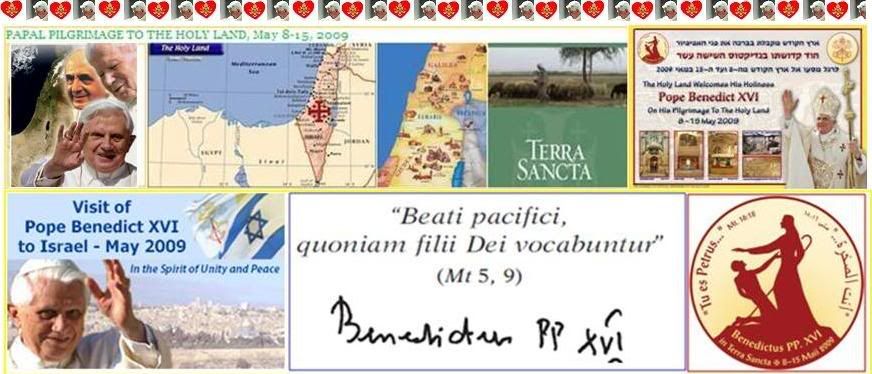 Day 1 - ISRAEL
Day 1 - ISRAEL
Arrival in Tel Aviv/Jerusalem
An event map from AP recapitulates the Pope's Holy Land pilgrimage at a glance:
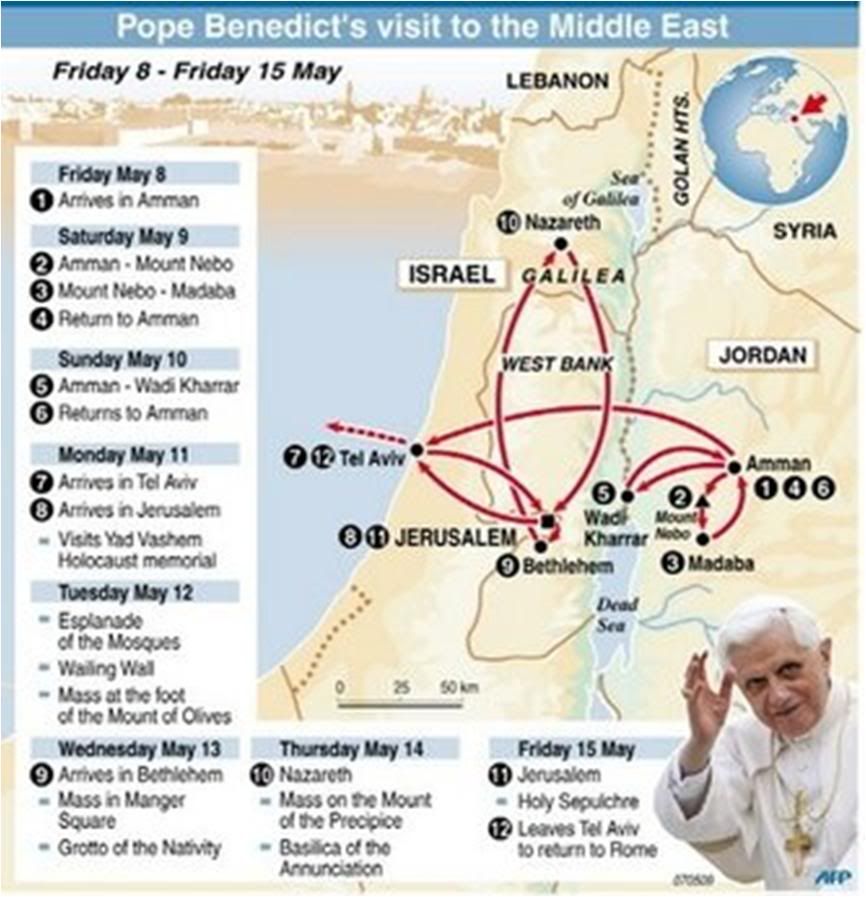 Oddly, only BBC has posted a report so far on the Pope's arrival in israel, where he has just now begun his courtesy visit with President Shimon Peres in Jerusalem, who presented him with a sheaf of a new double-yield variety of wheat developed by Israeli scientists and which President Peres said will be named 'Benedict XVI wheat'.
Pope on sensitive visit to Israel
Oddly, only BBC has posted a report so far on the Pope's arrival in israel, where he has just now begun his courtesy visit with President Shimon Peres in Jerusalem, who presented him with a sheaf of a new double-yield variety of wheat developed by Israeli scientists and which President Peres said will be named 'Benedict XVI wheat'.
Pope on sensitive visit to Israel

May 11, 2009
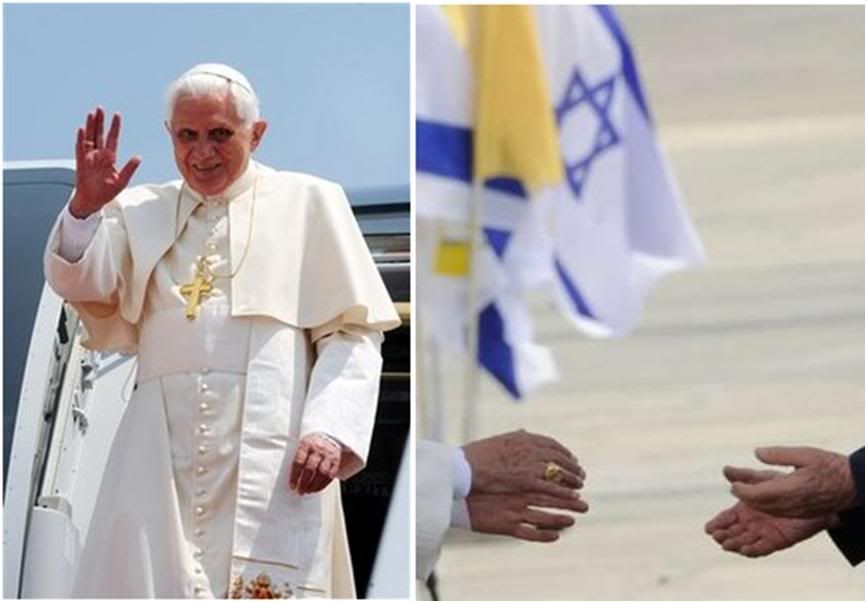
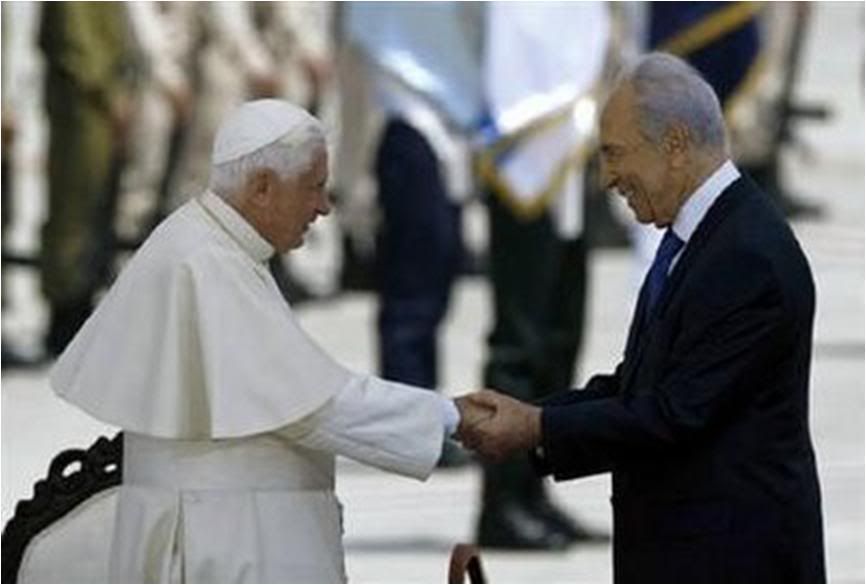
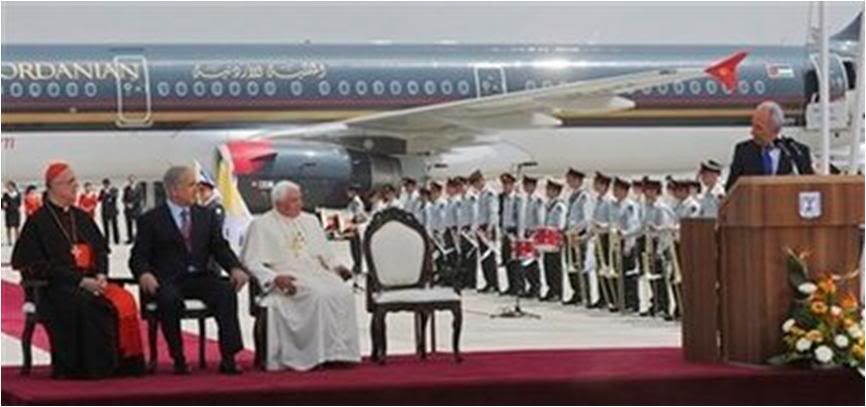
Pope Benedict XVI has arrived in Israel on the second and most sensitive leg of his Middle East tour.
He was greeted by Israeli leaders at an airport near Tel Aviv before flying to Jerusalem by helicopter.
During the next five days the pontiff will visit sacred sites linked with the life of Jesus and hold talks with Israeli and Palestinian leaders.
The Pope angered many in Israel by readmitting to the Church a bishop who had denied the extent of the Holocaust.
And some Israelis are also unhappy over the Pope's support for the beatification of Pope Pius XII - the pontiff during World War II who they believe did not do enough to save persecuted Jews.
Addressing the Pope at Ben Gurion airport, President Shimon Peres said he hoped the pontiff's visit would help "pave the road to peace".
In his arrival speech, the Pope immediately addressed the issue of Palestinian statehood.
"I plead with all those responsible to explore every possible avenue in the search for a just resolution of the outstanding difficulties," he said.
"So that both people may live in peace in a homeland of their own within secure and internationally recognised borders."
Prime Minister Benjamin Netanyahu, who was in the greeting party but did not make a speech, has so far not said if he would support a two-state solution.
Mr Netanyahu has now flown to Egypt, where the idea of a two-state solution will be high on the agenda in talks with President Hosni Mubarak.
The BBC's David Willey, travelling with the Pope, says the Catholic Church and the current Israeli government do not see eye-to-eye on Palestinian statehood.
He says the issue will be the main focus of talks between the Pope and the Israeli government over the next few days.
The Pope said Israel and the Vatican had many shared values, including the desire to put religion in its rightful place in society.
He also said he would pray for the six million victims of the Holocaust and promised to fight anti-Semitism around the world.
"I will have the opportunity to honour the memory of the six million Jewish victims of the Shoah," he said.
"Sadly anti-Semitism continues to rear its ugly head in many parts of the world. This is totally unacceptable."
Apart from celebrating Mass in Jerusalem and Nazareth, Pope Benedict will also visit some hugely sensitive sites - the Holocaust museum Yad Vashem on Monday and, later in the week the most sacred places in Jerusalem for Jews and Muslims.
He will also visit a Palestinian refugee camp close to Bethlehem.
Israel is beefing up security for the trip in an operation named "White Robe", with tens of thousands of law-enforcement officers deployed and entire sections of Jerusalem to be shut down.
During the previous leg of his tour - a three-day stay in Jordan - the Pope stressed the importance of Christians and Muslims working together.
Analysts say his words are likely to be heavily scrutinised during this week's trip.
Prime Minister Netanyahu joined the welcome ceremony at Ben Gurion airport before leaving for Egypt.
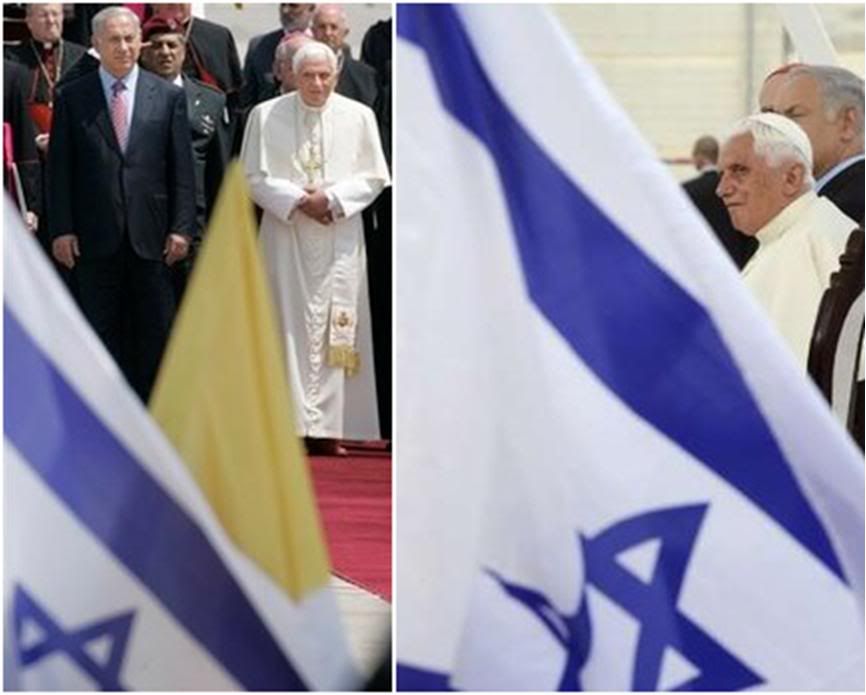 THE HOLY FATHER'S ADDRESS
THE HOLY FATHER'S ADDRESS
ON ARRIVING IN ISRAEL
Mr President,
Mr Prime Minister,
Your Excellencies, Ladies and Gentlemen,
Thank you for your warm welcome to the State of Israel, a land which is held holy by millions of believers around the world.
I am grateful to the President, Mr Shimon Peres, for his kind words, and I appreciate the opportunity that has been offered to me to come on pilgrimage to a land that is hallowed by the footsteps of patriarchs and prophets, a land that Christians hold in particular veneration as the setting for the events of the life, death and resurrection of Jesus Christ.
I take my place in a long line of Christian pilgrims to these shores, a line that stretches back to the earliest centuries of the Church’s history and which, I am sure, will continue long into the future.
I come, like so many others before me, to pray at the holy places, to pray especially for peace – peace here in the Holy Land, and peace throughout the world.
Mr President, the Holy See and the State of Israel have many shared values, above all a commitment to give religion its rightful place in the life of society.
The just ordering of social relationships presupposes and requires a respect for the freedom and dignity of every human being, whom Christians, Muslims and Jews alike believe to be created by a loving God and destined for eternal life.
When the religious dimension of the human person is denied or marginalized, the very foundation for a proper understanding of inalienable human rights is placed in jeopardy.
Tragically, the Jewish people have experienced the terrible consequences of ideologies that deny the fundamental dignity of every human person.
It is right and fitting that, during my stay in Israel, I will have the opportunity to honor the memory of the six million Jewish victims of the Shoah, and to pray that humanity will never again witness a crime of such magnitude.
Sadly, anti-Semitism continues to rear its ugly head in many parts of the world. This is totally unacceptable. Every effort must be made to combat anti-Semitism wherever it is found, and to promote respect and esteem for the members of every people, tribe, language and nation across the globe.
During my stay in Jerusalem, I will have the pleasure of meeting many of this country’s distinguished religious leaders. One thing that the three great monotheistic religions have in common is a special veneration for that holy city.
It is my earnest hope that all pilgrims to the holy places will be able to access them freely and without restraint, to take part in religious ceremonies and to promote the worthy upkeep of places of worship on sacred sites.
May the words of Isaiah’s prophecy be fulfilled, that many nations shall flow to the mountain of the house of the Lord, that he may teach them his ways, that they may walk in his paths – paths of peace and justice, paths that lead to reconciliation and harmony (cf. Is 2:2-5).
Even though the name Jerusalem means “city of peace”, it is all too evident that, for decades, peace has tragically eluded the inhabitants of this holy land.
The eyes of the world are upon the peoples of this region as they struggle to achieve a just and lasting solution to conflicts that have caused so much suffering.
The hopes of countless men, women and children for a more secure and stable future depend on the outcome of negotiations for peace between Israelis and Palestinians.
In union with people of good will everywhere, I plead with all those responsible to explore every possible avenue in the search for a just resolution of the outstanding difficulties, so that both peoples may live in peace in a homeland of their own, within secure and internationally recognized borders.
In this regard, I hope and pray that a climate of greater trust can soon be created that will enable the parties to make real progress along the road to peace and stability.
To the Catholic bishops and faithful here present, I offer a special word of greeting. In this land, where Peter received his commission to feed the Lord’s sheep, I come as Peter’s successor to minister among you.
It will be my special joy to join you for the concluding celebrations of the Year of the Family, due to take place in Nazareth, home of the Holy Family of Jesus, Mary and Joseph.
As I said in my Message for the World Day of Peace last year, the family is the “first and indispensable teacher of peace” (No. 3), and hence it has a vital role to play in healing divisions in human society at every level.
To the Christian communities in the Holy Land, I say: by your faithful witness to him who preached forgiveness and reconciliation, by your commitment to uphold the sacredness of every human life, you can make a particular contribution to ending the hostilities that for so long have afflicted this land.
I pray that your continuing presence in Israel and the Palestinian Territories will bear much fruit in promoting peace and mutual respect among all the peoples who live in the lands of the Bible.
Mr President, ladies and gentlemen, once again I thank you for your welcome and I assure you of my sentiments of good will. May God give his people strength! May God bless his people with peace!
From Tel Aviv international airport, the Holy Father was flown to Jerusalem by helicopter, arriving at the heliport on Mt. Scopus.
Inset shows the Pope on the helicopter.
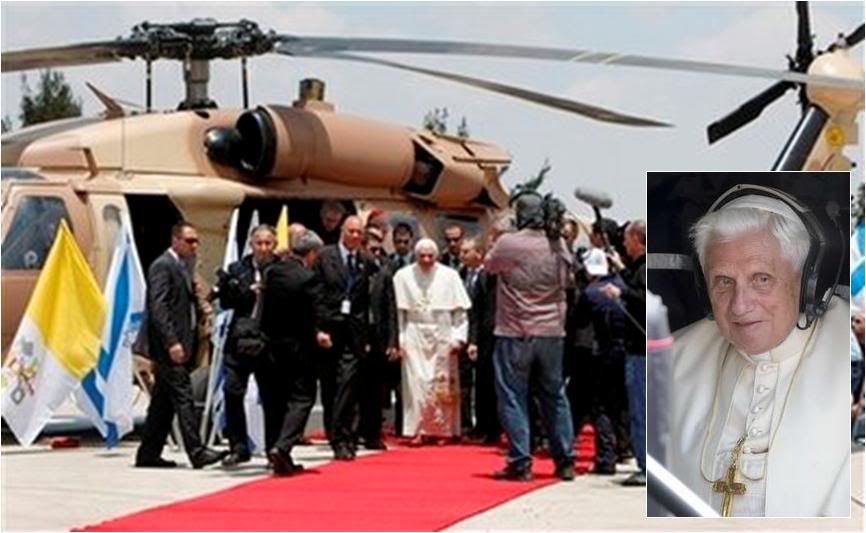 The Pope is welcomed by Jerusalem Mayor Nir Barkat.
The Pope is welcomed by Jerusalem Mayor Nir Barkat.
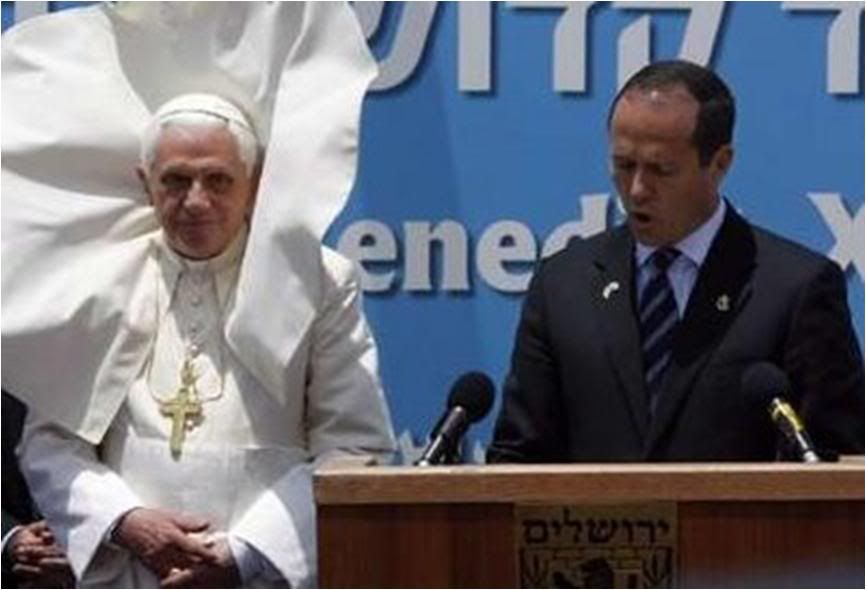 Pope in Israel
Pope in Israel
calls for Palestinian homeland
By VICTOR L. SIMPSON

JERUSALEM, May 11 (AP) – Pope Benedict XVI called for the establishment of an independent Palestinian homeland immediately after he arrived in Israel Monday, a stance that could put him at odds with his hosts on a trip aimed at improving ties between the Vatican and Jews.
The Pope also took on the delicate issue of the Holocaust, pledging to "honor the memory" of the 6 million Jewish victims of the Nazi genocide at the start of his five-day visit to Israel and the Palestinian territories.
Benedict touched down in Israel on the second leg of a weeklong pilgrimage to the Holy Land, after spending three days in neighboring Jordan. He is using the tour to reach out to both Muslims and Jews.
In his first public comments upon arriving, Benedict urged Israelis and Palestinians to "explore every possible avenue" to resolve their differences.
"The hopes of countless men, women and children for a more secure and stable future depend on the outcome of negotiations for peace," he told a welcoming ceremony at Israel's international airport.
"In union with people of goodwill everywhere, I plead with all those responsible to explore every possible avenue in the search for a just resolution of the outstanding difficulties, so that both peoples may live in peace in a homeland of their own within secure and internationally recognized borders."
While Benedict has spoken in favor of a Palestinian homeland in the past, the timing and location of his comments were noteworthy.
Israeli Prime Minister Benjamin Netanyahu, who was in the audience, has pointedly refused to endorse the two-state solution since his election. But he is expected to come under pressure to do so when he travels to Washington next week. Netanyahu did not speak at the ceremony, then flew to Egypt for talks on regional issues with President Hosni Mubarak.
Israeli Foreign Ministry spokesman Yigal Palmor played down the Pope's comments, saying he was voicing a long-standing position shared by the U.S. and European countries.
"At any rate, discussing this is not the purpose of the visit," he said.
Parliament speaker Reuven Rivlin conspicuously skipped the airport ceremony, though his office said he would join the Pope at Israel's Yad Vashem Holocaust memorial.
The Pope has tried to improve interfaith relations throughout his four-year papacy, and as a cardinal, had a long record of promoting dialogue with other faiths. But Benedict has had to tread carefully on his Middle East visit because of past gaffes.
Benedict angered many in the Muslim world three years ago when he quoted a medieval text that characterized some of Islam's Prophet Muhammad's teachings as "evil and inhuman," particularly "his command to spread by the sword the faith." He later expressed regret that his comments offended Muslims.
Before leaving Jordan, he said he had a "deep respect" for Islam.
The Vatican has also been widely accused over the years of not doing enough to stop the Holocaust — a charge it rejects. And the German-born Pope himself has faced questions for his involvement in the Hitler Youth corps during the war. Benedict says he was coerced.
The Pope outraged Jews earlier this year when he revoked the excommunication of a British bishop who denies the Holocaust. Ties were further strained when a senior Vatican official said during Israel's recent military campaign in Gaza that the territory resembled a "big concentration camp."
Later Monday, Benedict was scheduled to lay a wreath at Yad Vashem.
"It is right and fitting that, during my stay in Israel, I will have the opportunity to honor the memory of the 6 million Jewish victims of the shoah," he said, using the Hebrew word for the Holocaust. He said he would "pray that humanity will never again witness a crime of such magnitude."
Israel and the Vatican are also at odds over the legacy of World War II Pontiff Pius XII, a candidate for sainthood. At Yad Vashem, Benedict will not visit the main part of the museum, where a photo caption says Pius did not protest the Nazi genocide of Jews and maintained a largely "neutral position."
Dignitaries and religious leaders greeted the Pontiff at a red-carpet ceremony at the Tel Aviv airport. Yellow and white Vatican flags fluttered alongside blue and white Israeli banners as an honor guard played in the background.
The Pope smiled as he walked along the carpet, flanked by Israeli President Shimon Peres on one side and Netanyahu on the other. Other political leaders, along with black-robed Christian clergymen and Muslim religious leaders, stood in line to shake his hand.
"Your visit here brings a blessed understanding between religions and spreads peace near and far. Historic Israel and the renewed Israel together welcome your arrival as paving the great road to peace," Peres said.
Later, the Pope flew by helicopter to Jerusalem for another red-carpet ceremony. Mayor Nir Barkat handed Benedict an ancient map of the world, with Jerusalem in the center and dozens of children from three schools — Christian, Jewish and Muslim — welcomed him.
The children waved Israeli and Vatican flags and red carnations, and many wore T-shirts that read, "I'm with the Pope in Jerusalem."
"He loves us and wants peace," said David Sahagian, a 10-year-old from a Christian school in east Jerusalem. "I want there to be peace in Jerusalem and I want him to give us his blessing."
In the Gaza Strip, Palestinians were angry that the Pope planned to meet with the family of an Israeli soldier held by militants in Gaza for nearly three years but would not meet with relatives of any of the 11,000 Palestinian prisoners imprisoned in Israel.
Israeli police shut down a media center for the Pope's visit that the Palestinian Authority had set up at an east Jerusalem hotel. Israeli authorities object to any attempt by the Palestinians to use east Jerusalem for official business because that would suggest Palestinian sovereignty there.
Israel captured east Jerusalem in the 1967 Mideast war and the Palestinians claim it as capital of a future state.
 I hope you are watching the live coverage of the Holy Father with President Perez - a musical number about peace performed by a children's choir and two Jewish cantors (both tenors) with the most exquisite voices, following most touching speeches by both President Peres and the Holy Father. He will be proceeding to Yad Vashem now.
I hope you are watching the live coverage of the Holy Father with President Perez - a musical number about peace performed by a children's choir and two Jewish cantors (both tenors) with the most exquisite voices, following most touching speeches by both President Peres and the Holy Father. He will be proceeding to Yad Vashem now.
The Jerusalem Post has a convenient 'Pope in the Holy Land' dossier which gathers together the main articles they have published so far on the Pope's visit since it was first announced.
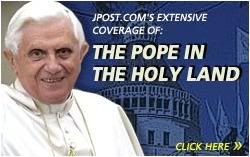
Some of it is unpleasant, even downright nasty, as, for instance a column
offensively entitled "For the Jews, there's really only one Pope" - a demeaning and utterly condesceding diatribe by one David Horovitz, written at the time the Pope announced his trip last March, comparing Nemedict XVI in the most unflattering terms with John Paul II, and with almost insulting remarks about Paul VI [whom he faults basically because he visited Israel before there were diplomatic relations between the Vatican and Israel], and of course, Pius XII.
Militant Jews are forever offended at Christians for wrongs done centuries ago, forgetting that it is they who insist on carrying on a bitter enmity against Christians today, in hostile ways that no right-thinking Christian would ever think of waging against members of other religions.
What Horovitz writes would easily qualify as a litigable 'hate crime' under the bill that liberal Democrats and fringe elements like the ACLU are trying to pass in the United States.
Anyway, Here's the JPost's report on the Pope's arrival:
 Pope vows to fight anti-Semitism
Pope vows to fight anti-Semitism
By JPOST STAFF, ETGAR LEFKOVITS AND AP

Pope Benedict XVI arrived in Israel on Monday, starting a historic five-day pilgrimage by calling for peace, an end to anti-Semitism, and freedom of worship and understanding between religions.
"Thank you for your warm welcome to Israel, a land which is holy to millions," Benedict said. "I appreciate the opportunity to come here."
"I come, like so many others before me, to pray at the holy places, to pray especially for peace - peace here in the Holy Land, and peace throughout the world," the pope continued, adding that although the name Jerusalem meant "city of peace," it was all too evident that peace had eluded the region.
Benedict called for the establishment of an independent Palestinian homeland immediately after he arrived in Israel, a stance that could put him at odds with his hosts on a trip aimed at easing strains between the Vatican and Jews.
First, he has always endorsed the two-state idea, so that's not news at all - it would have been news if he did not mention it! Second, he did not directly "call for the establishment of an independent Palestinian state" as reported - of all people, he has the common sense to be so directly provocative as soon as he stepped on Israeli soil.
What he said, exactly was:
In union with people of good will everywhere, I plead with all those responsible to explore every possible avenue in the search for a just resolution of the outstanding difficulties, so that both peoples may live in peace in a homeland of their own, within secure and internationally recognized borders.
And though Netanyahu's government may make noises about being against the two-state solution, the previous government (under Sharon and then Olmert) were working with this in mind, and Israel took part in teh Annapolis Conference for a two-state solution in 2007.So the Pope is not exactly breaking any new ground here, much less saying the unthinkable!]
Benedict urged Israelis and Palestinians to "explore every possible avenue" to resolve their differences in remarks at the airport after he landed.
"The hopes of countless men, women and children for a more secure and stable future depend on the outcome of negotiations for peace," he said. "In union with people of goodwill everywhere, I plead with all those responsible to explore every possible avenue in the search for a just resolution of the outstanding difficulties, so that both peoples may live in peace in a homeland of their own within secure and internationally recognized borders."
The Pope also took on the issue of the Holocaust, pledging to "honor the memory" of the six million Jewish victims of the Nazi genocide.
He vowed to battle rising anti-Semitism, and spoke about his upcoming visit to Yad Vashem later in the day.
"Tragically, the Jewish people have experienced the terrible consequences of ideologies that deny the fundamental dignity of every human person," he said. "It is right and fitting that, during my stay in Israel, I will have the opportunity to honor the memory of the six million Jewish victims of the Shoah, and to pray that humanity will never again witness a crime of such magnitude."
"Sadly, anti-Semitism continues to rear its ugly head in many parts of the world. This is totally unacceptable," the pope continued. "Every effort must be made to combat anti-Semitism wherever it is found, and to promote respect and esteem for the members of every people, tribe, language and nation across the globe."
Turning to politics, the Pontiff urged both Israelis and Palestinians to find a solution which will allow each side to live peacefully together.
"The eyes of the world are upon the peoples of this region as they struggle to achieve a just and lasting solution to conflicts that have caused so much suffering," he said. "The hopes of countless men, women and children for a more secure and stable future depend on the outcome of negotiations for peace between Israelis and Palestinians.
"In union with people of good will everywhere, I plead with all those responsible to explore every possible avenue in the search for a just resolution of the outstanding difficulties, so that both peoples may live in peace in a homeland of their own, within secure and internationally recognized borders," the pope said. "In this regard, I hope and pray that a climate of greater trust can soon be created that will enable the parties to make real progress along the road to peace and stability."
Upon arrival at Ben-Gurion Airport, the pontiff was greeted by President Shimon Peres in a red-carpet reception. Peres warmly welcomed Benedict as "first among the faithful," and voiced hope that his presence would help foster peace in the region.
"Your Holiness the Pope, Benedict XVI, in the name of the State of Israel I welcome you and offer you a blessing on your arrival: peace," Peres said in Hebrew. Then, switching to Latin, added, "Hail Benedictus, first among the faithful, who visits the Holy Land today."
"I see your visit here, to the Holy Land, as an important spiritual mission of the highest order: a mission of peace," the president continued. "A mission of planting seeds of tolerance and uprooting the weeds of fanaticism. I appreciate your stances and your actions to bring down the level of violence and hatred in the world."
The Pope's trip comes amid lingering suspicions among Jews and Muslims over past actions and remarks by the Catholic spiritual leader. In his greetings, Peres alluded to that rift.
"I am certain that this will be a continuation of the dialogue between Judaism and Christianity in the spirit of the Prophets," he said. "Israel safeguards the absolute freedom of religious practice and free access to holy places. We are always happy to receive pilgrims from throughout the world in the Holy Land."
"We have made peace with Egypt and Jordan, and we are in negotiations to make peace with the Palestinians, and even to arrive at a comprehensive regional peace," the president continued. "Your visit here brings a blessed understanding between religions and spreads peace near and far. Historic Israel and the renewed Israel together welcome your arrival as paving the great road to peace from city to city."
Following the ceremony at the airport, Benedict XVI arrived in Jerusalem by helicopter, where he met with Mayor Nir Barkat upon his arrival in the capital.
"During your stay here, you will feel at home amongst friends who practice many faiths together in peace, harmony, and freedom," said Barkat. "You will feel at home as you breathe the ancient history and modern culture of Jerusalem. And you will feel at home because you too, Your Holiness, are a shareholder of this great city."
Barkat used the opportunity to call upon every person of faith to visit Jerusalem at least once in his/h lifetime.
Rebecca Anna Stoil contributed to this report.
[Modificato da TERESA BENEDETTA 12/05/2009 02:01]